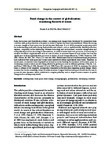Rural change in the context of globalization: Examining theoretical issues
| dc.contributor.author | Da Silva Machado, F | en |
| dc.date.accessioned | 2018-01-23T18:19:33Z | |
| dc.date.available | 2018-01-23T18:19:33Z | |
| dc.date.issued | 2017-01-01 | en |
| dc.identifier.issn | 2064-5031 | en |
| dc.identifier.uri | http://hdl.handle.net/10026.1/10655 | |
| dc.description.abstract |
Early discussions and theoretical positions concerning rural change were developed by researchers from countries with post-production economies in order to explain the rural transformations. When discussing economic change in rural space over the last decades, Marsden, T. et al. (1993) presented a new perspective for understanding rural restructuring that includes new subjects, such as capital mobility, flexible production regimes, complexity in the relationship between technology and environment, economic deregulation and new political processes. According to these authors, in order to understand such processes, it is necessary to research the effects of globalization at local scale of action. A recurrent theme in rural studies has been the significance of diverse globalization processes as drivers of rural change (Marsden, T. 2003; Robinson, G.M. 2004; Woods, M. 2005, 2007; Ploeg, J.D. van der 2008). Multidimensional and multidirectional perspectives have indicated that rural space has become more embedded within a globalized rural world. Therefore, in recent years, researchers have displayed an interest in understanding the dynamics of the rural spaces in developing countries which are also being affected by global processes in different pathways (Wilson, G.A. and Rigg, J. 2003; Rigg, J. 2006; Bryant, C.R. et al. 2008; Ploeg, J.D. van der et al. 2010). In summary, this article forms a critique of the simplistic assumptions formulated in the literature regarding spatial change, which assumes the rural is essentially subject to external actions. I argue that the rural space should also be seen to possess its own dynamics which contribute to complex pathways and so adapts to new scenarios of spatial change in the contemporary world. | en |
| dc.format.extent | 43 - 53 | en |
| dc.language.iso | en | en |
| dc.title | Rural change in the context of globalization: Examining theoretical issues | en |
| dc.type | Journal Article | |
| plymouth.issue | 1 | en |
| plymouth.volume | 66 | en |
| plymouth.publication-status | Published | en |
| plymouth.journal | Hungarian Geographical Bulletin | en |
| dc.identifier.doi | 10.15201/hungeobull.66.1.5 | en |
| plymouth.organisational-group | /Plymouth | |
| plymouth.organisational-group | /Plymouth/Faculty of Science and Engineering | |
| plymouth.organisational-group | /Plymouth/Faculty of Science and Engineering/School of Geography, Earth and Environmental Sciences | |
| dc.identifier.eissn | 2064-5147 | en |
| dc.rights.embargoperiod | Not known | en |
| rioxxterms.versionofrecord | 10.15201/hungeobull.66.1.5 | en |
| rioxxterms.licenseref.uri | http://www.rioxx.net/licenses/all-rights-reserved | en |
| rioxxterms.type | Journal Article/Review | en |


